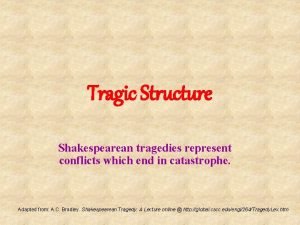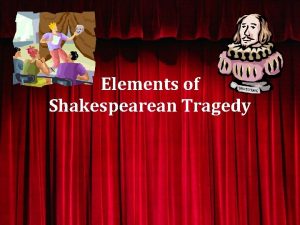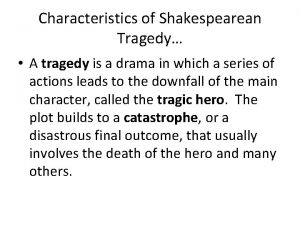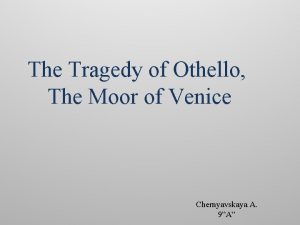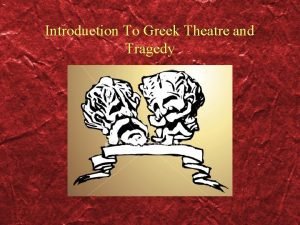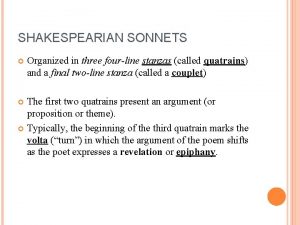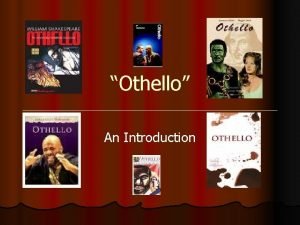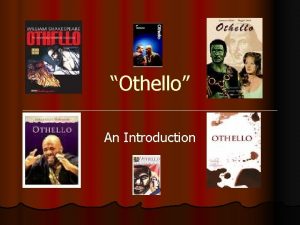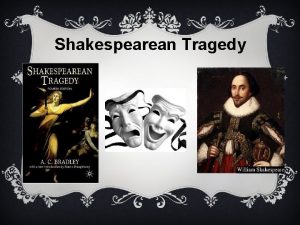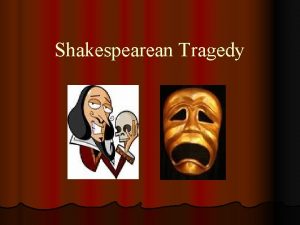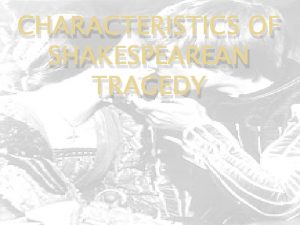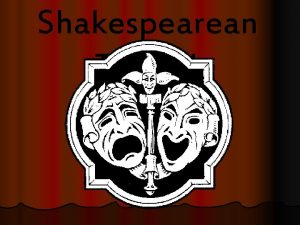Othello An Introduction Othello A Shakespearean Tragedy l





















- Slides: 21

Othello An Introduction

Othello – A Shakespearean Tragedy l l Othello is a Shakespearean Tragedy It encompasses elements of tragedies such as: A serious play ending with the death of numerous characters including the title character l The protagonist is admirable, but flawed, with the audience able to understand sympathize with the character. l

Tragedy (cont. ) The protagonist is capable of both good and evil l Hero is led into fatal calamity by hamartia (tragic flaw or error) which often takes the form of hubris (excessive pride leading to divine retribution l Tragic effect depends upon audience’s awareness of the admirable qualities of the hero which are wasted in the disaster l Achieves a catharsis (an emotional release) by arousing pity in the audience l

Tragic Hero l l l The tragic hero is a good man, important to society The hero suffers a fall brought about by something in his nature The fall provokes the emotions of pity and fear in the reader The tragic character comes to some kind of understanding or new recognition of what has happened Tragic flaw – defect of character that leads to the hero’s disastrous downfall

The Language Verse: Poetic language that includes meter and sometimes rhyme; organized in lines with a consistent number of syllables Prose: Ordinary written language with no meter or rhyme; organized in sentences

Verse vs. Prose: Usage l Poetic style of verse used for high status characters, great affairs of war and state, and tragic moments. l Prose used for low status characters (servants, clowns, drunks, villains), proclamations, written challenges, accusations, letters, comedic moments, and to express madness

Aside, Monologue, Soliloquy Aside: Monologue: Soliloquy: a character’s remark, either to the audience or another character, that other characters on stage are not supposed to hear an extended speech by a single character that is uninterrupted by others a speech a character gives s/he is alone on stage

Setting l Journey from Venice, Italy to Cyprus l Venice = order, rule of reason ? l Cyprus = disorder, rule of passion ?

The world’s greatest… l l By the time he’d written Othello (around 1604) Shakespeare was considered the greatest playwright of his day. Many feel that Shakespeare's later plays show a darker, more pessimistic view of the world than his early plays. Under James I (his rule is referred to as the Jacobean period), England lost some of its power and prosperity. Too, conflicts between Catholics and Protestants led to civil strife. Shakespeare's earlier plays reflected Elizabeth's golden reign. By 1604, when Othello was first produced, the headiness of the Elizabethan period was recent history. This is reflected in the fact that, unlike his other tragedies, there is no resolution to the conflict caused at the end of the play.

Othello – a moor Othello is described in the play as a moor, and a general in the Venetian Army. The origin of the word “moor” comes from the Greek word mauros meaning dark or very dark. A Muslim person of Arab and Berber descent from northwest Africa. Moors invaded Spain and established a civilization in Andalusia lasting from the 8 th -- 15 th centuries

What does it mean to be Moorish? Moors were characterized in Elizabethan England as being alternately or simultaneously noble or monstrous, civil or savage. l It was often the case (in literature) that a moor was presented as someone accepted by society to a certain point, but then rejected due to other factors. l

Iago is one of Shakespeare’s most sinister villains, often considered so because of the unique trust Othello puts in him, which he betrays while maintaining his reputation of honesty and dedication. l Shakespeare contrasts Iago with Othello’s nobility and integrity. l Iago is a malcontent – he has a bitter and cyncial view of the world around him. l The name Iago is a shortened version of the Spanish name “Santiago” or “St James”. l Saint James of Spain was also known as “St James the Moor Killer” which seems appropriate within the play. l

Winning a fair lady… Men were expected to go through distinct stages of courtly love in order to woo a woman. l It was thought that love wasn’t entirely platonic, but that it was based on sexual attraction. l As the etiquette of courtly love became more complicated, the knight might wear the colours of his lady: blue or black were the colors of faithfulness; green was a sign of unfaithfulness. l The stages of courtly love: l Attraction to the lady, usually via eyes/glance l Worship of the lady from afar l Declaration of passionate devotion l Virtuous rejection by the lady l Renewed wooing with oaths of virtue and eternal fealty l Moans of approaching death from unsatisfied desire (and other physical manifestations of lovesickness) l Heroic deeds of valor which win the lady's heart l Consummation of the secret love l Endless adventures and subterfuges avoiding detection

The Wife’s Status The husband, in the accepted role as head of the household, gives moral direction to his wife and children--who sit obediently listening. l “Ye women, submit your selves unto your own husbands, as unto the Lord. For the husband is the wife's head, even as Christ is the head of the Church, and he is the saviour of the whole body. Therefore as the Church in congregation is subject unto Christ: so likewise let the wives be in subjection unto their own husbands in all things” (“The Book of Common Prayer”) l A typical wife receiving her instruction

Evil Women! In the Elizabethan times there was a long and well established tradition in the Church of what we would now call misogyny – women were distrusted simply because they were women. At the time it was assumed that women would cheat – it was part of their nature! The men in Othello have differing views of women – from Othello who idolizes his wife (Desdemona) to Iago who sees love as "merely a lust of the blood and a permission of the will“. The attitudes of the audience at the time are likely to have been varied too.

The Cuckold Any man whose wife cheated on him (without his knowledge) was known as a cuckold. The word derives from “cuckoo” – the bird known for laying their eggs in another’s nest. It was highly undesirable to be considered a cuckold. All of the community would find out about it and it was considered a public humiliation. Cuckolds were often described as having horns – a hangover from the days when a cuckold was forced to parade around his town wearing antlers as a sign of his wife’s infidelity.

Jealousy was viewed as something irrational and linked to the deadly sin of envy. l It was viewed as a sudden infection against which there was no prevention or cure. l It was thought of as eroding trust and it dissolved the bonds holding together marriages, families and social frameworks. l Being jealous could let in evil and chaos and it was a state greatly feared by Shakespeare’s audiences. l

Jealousy and Deception Do you consider yourself to be a jealous person? Why? l Have you ever deceived anyone? Why? l Is jealously acceptable in a relationship? l Is it ever okay to knowingly deceive someone? l

Quotations on Jealousy – Do you agree? “Love sees sharply, hatred sees even more sharp, but Jealousy sees the sharpest for it is love and hate at the same time” “Jealousy is nothing more than a fear of abandonment ” “ In jealousy there is more of self-love than love. ” “A competent and self-confident person is incapable of jealousy in anything. Jealousy is invariably a symptom of neurotic insecurity. ” “Jealousy is a disease, love is a healthy condition. The immature mind often mistakes one for the other, or assumes that the greater the love, the greater the jealousy -- in fact, they're almost incompatible; one emotion hardly leaves room for the other. Both at once can produce unbearable turmoil. . . ”

Quotations on Deception – Do you agree? “We are never deceived; we deceive ourselves. ” “Deception is a cruel act. . . It often has many players on different stages that corrode the soul. ” “It's better to get something worthwhile done using deception than to fail to get something worthwhile done using truth. ” “Truth lives on in the midst of deception”

Today’s society - TASK Think about the cultural rules that you live by. Look at the questions opposite and discuss/make notes. What rules dictate the behaviour of young men and women in relationships today? l What are things “nice girls” just don’t do? l What are things “nice boys” just don’t do? l What do you think the consequences are of breaking these rules? l
 What is a greek tragedy
What is a greek tragedy Shakespearean tragedy definition
Shakespearean tragedy definition Shakespearean drama characteristics
Shakespearean drama characteristics Shakespeare tragedy structure
Shakespeare tragedy structure Sarcasm in twelfth night
Sarcasm in twelfth night Elements of tragedy in literature
Elements of tragedy in literature Definition of shakespearean tragedy
Definition of shakespearean tragedy Elements of shakespearean tragedy
Elements of shakespearean tragedy Characteristics of a tragedy
Characteristics of a tragedy Othello act 1 scene 1 analysis
Othello act 1 scene 1 analysis The tragedy of othello the moor of venice
The tragedy of othello the moor of venice Greek tragedy definition
Greek tragedy definition Parts of ancient greek theater
Parts of ancient greek theater Shakespearean prince of denmark
Shakespearean prince of denmark Short sonnet
Short sonnet Shakespearean sonnet are organized in
Shakespearean sonnet are organized in Shakespearean tragic hero
Shakespearean tragic hero Shakespearean english
Shakespearean english Petrarch sonnet 1
Petrarch sonnet 1 What words did shakespear make
What words did shakespear make Shakespearean language cheat sheet
Shakespearean language cheat sheet Shakespearean sonnet characteristics
Shakespearean sonnet characteristics



